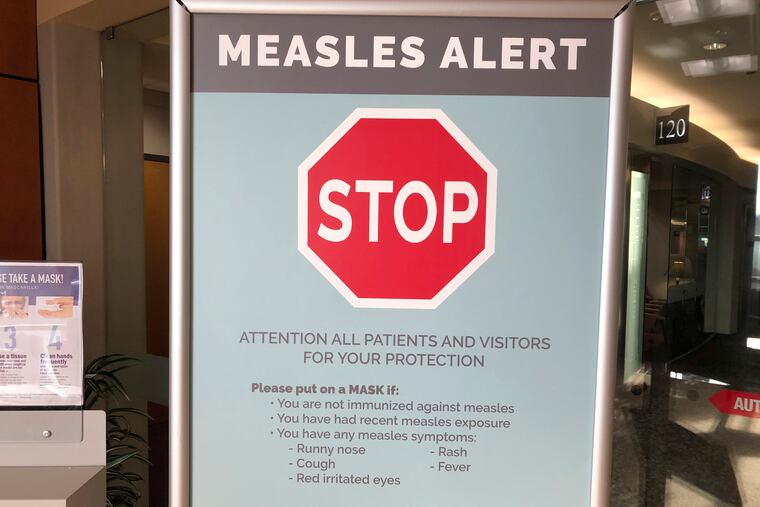As mumps and measles cases soar, Pa.’s legislature considers bill that would require doctors to treat unvaccinated kids
The bill says a health provider could not “harass, coerce, scold or threaten” a patient or parent for refusing immunization. It would also forbid health insurers from penalizing doctors for low immunization rates.

At a time when measles cases have hit their highest U.S. level in 25 years, and outbreaks are reported in countries around the globe, a proposed bill in the Pennsylvania legislature is winning support among anti-immunization activists who believe vaccines are a threat to health.
A news conference is planned Tuesday in Harrisburg to call attention to the bill, introduced in January by Rep. Daryl D. Metcalfe (R., Butler), that would bar doctors from denying care to children whose parents have chosen to not have them vaccinated.
The bill — House Bill 286, also known as the Informed Consent Protection Act — says a health provider could not “harass, coerce, scold or threaten” a patient or parent for refusing immunization. It would also forbid health insurers from penalizing doctors for low immunization rates. Doctors in turn could not accept bonuses or other incentives from insurance or drug companies for vaccinating patients.
Metcalfe and anti-vaccination experts scheduled to speak at the Tuesday event either did not respond to or declined The Inquirer’s requests to be interviewed.
Nationally, the U.S. measles outbreak has hit 704 cases, and incidences of the highly contagious and potentially fatal disease are expected to keep climbing. Mumps outbreaks have also been reported around the country, including a recent one at Temple University that has sickened at least 140 people. The measles, mumps, and rubella (MMR) vaccine protects against both diseases. It is recommended for all children starting with the first dose at 12 to 15 months, according to the U.S. Centers for Disease Control and Prevention.
In Pennsylvania, parents can refuse to have their children vaccinated for religious or personal reasons.
Most members of the medical and scientific communities national and globally view vaccination as a crucial way to prevent disease and save lives for millions of people.
However, immunization opponents say vaccines pose health threats, including increased cases of autism, diabetes, cancer, infertility, and other conditions — contentions most health experts say are not backed by scientific studies or data. The anti-vaccine activists also allege parents and others are not adequately being informed about potential problems caused by vaccines.
“The atmosphere for those who do not vaccinate their children has been hostile at times, so they keep their heads down and do not speak out against vaccines publicly. … That is why I am doing everything I can to educate others about the dangers of vaccines,” said Lynn Landes, a Philadelphia anti-vaccine activist and cofounder of HealthAlertPhilly.org.
But most health experts hold different views.
This month, UNICEF launched a #VaccinesWork campaign to spread support for immunization which it says saves up to three million lives a year. The Bill and Melinda Gates Foundation has pledged $1 for every like or share on social media using the hashtag #VaccinesWork in the month of April.
Caryl Stern, president of UNICEF USA, said one in five of the world’s most vulnerable children still don’t have access to vaccines.
“Science has disproved many of the theories about what vaccinations might do and has proven what they can do. … I find it hard to grasp those who are choosing not to take advantage of what is readily available to them,” Stern said.
Gary Emmett, a professor of pediatrics with Thomas Jefferson University, predicted that doctors would not comply with the bill if passed.
“If your child isn’t getting immunized, it’s not just a danger for your child. It’s a danger for every child in the office,” Emmett said.
Additionally, pregnant women could be at heightened risk of infection, even if they have been vaccinated, he said.
State law does not specifically address doctors who refuse to treat unvaccinated patients, said Wanda Murren, a State Department spokesperson. However, state regulations say doctors should not discharge patients in their care without adequate warning.
Independence Blue Cross, the region’s largest health insurer, defended its practice of offering financial incentives to doctors who provide preventive services, including screenings and vaccinations.
“These programs include pediatric immunizations, and we are supportive of efforts that ensure children have access to these vaccines,” said Donna Crilley-Farrell, IBC spokesperson.
>> READ MORE: Blue Cross study finds childhood vaccination rates up in Philly
State Rep. Kathy L. Rapp (R., Warren), chairwoman of the Health Committee in the House of Representatives, said many parents have voiced concern about vaccines. She said one mother came all the way from Pittsburgh to her office to express support for the bill.
“I take it that people are extremely concerned when they’re willing to drive three hours,” said Rapp.
Rapp said she was leaning toward putting the bill to a committee vote. If approved, it could go on to a full House vote.